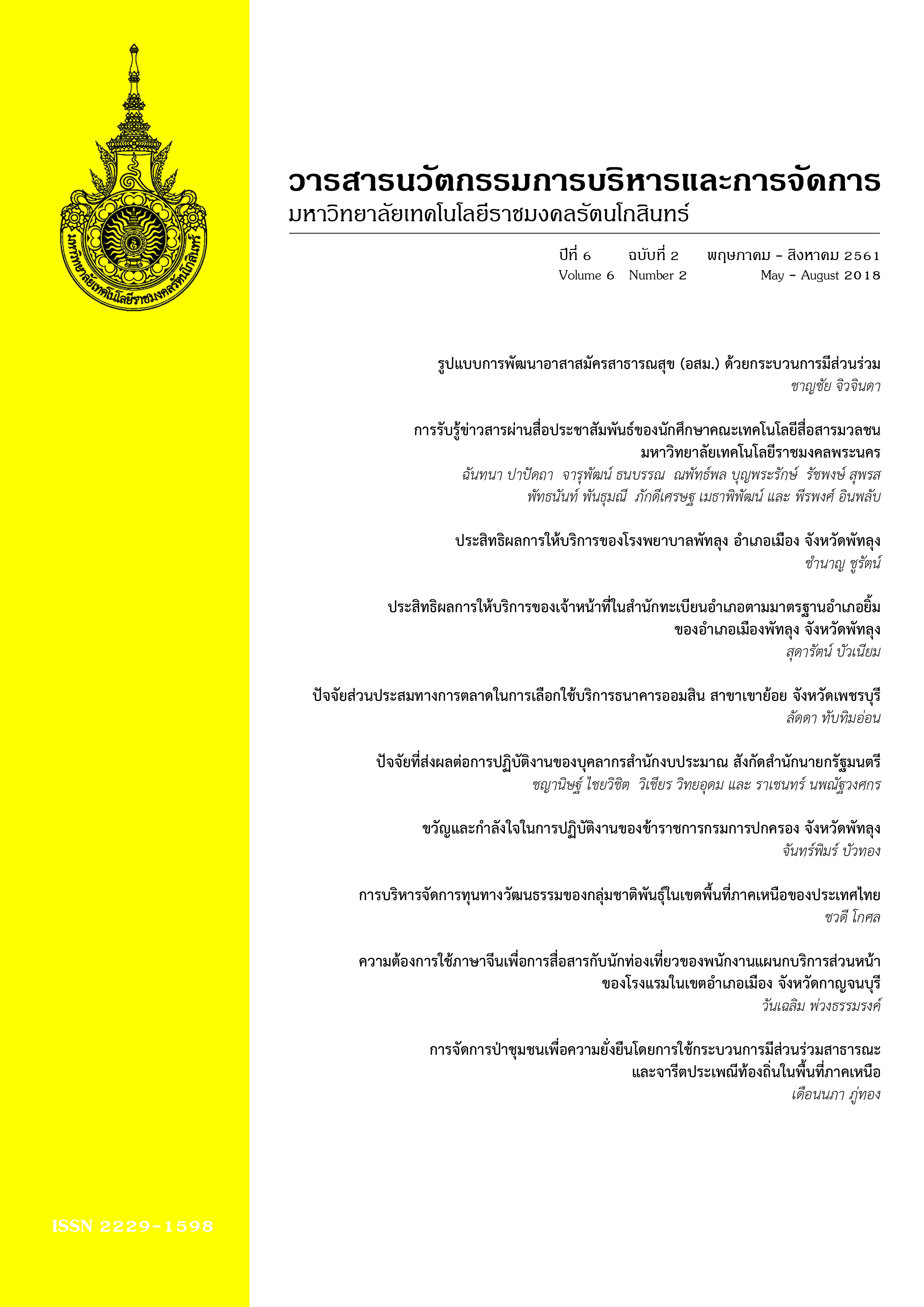การบริหารจัดการทุนทางวัฒนธรรมของกลุ่มชาติพันธุ์ในเขตพื้นที่ภาคเหนือของประเทศไทย
Main Article Content
บทคัดย่อ
บทคัดย่อ
กลุ่มชาติพันธุ์เป็นส่วนสำคัญของความมั่นคงขั้นพื้นฐาน และผลประโยชน์ทางเศรษฐกิจ คนในกลุ่มชาติพันธุ์เหล่านี้ มีบทบาทหน้าที่สำคัญในการทำประโยชน์ให้กับประเทศมากมาย ความหลากหลายทางชาติพันธุ์นี้ ส่งผลให้ประเทศไทยมีมรดก อัตลักษณ์ทางวัฒนธรรมที่มีความหลากหลายล้วนมีคุณค่า ได้แก่ ภาษา ศิลปะการแสดง อาหาร การแต่งกาย ความเชื่อ วิถีชีวิต และประเพณีต่างๆ สิ่งต่างๆเหล่านี้ คือ ทุนทางวัฒนธรรม ที่ช่วยสร้างโอกาสให้ประชาชนทุกสาขาให้มีอาชีพ ส่งเสริมเศรษฐกิจท้องถิ่นและสถาบันภาครัฐ องค์กรต่างๆ มีอิทธิพลต่อการกำหนด “เป้าหมาย” ทางเศรษฐกิจ สังคม เป็นข้อมูลในการวางนโยบาย และแผนปฏิบัติงาน เพื่อพัฒนาคุณภาพชีวิตด้านต่างๆของคนในชุมชนท้องถิ่นตามแบบแผนขับเคลื่อนเศรษฐกิจ ไทยนิยม การศึกษาวัตถุประสงค์ เพื่อ 1) ศึกษาบริบททางเศรษฐกิจ สังคม วัฒนธรรม การเมือง ที่มีผลต่อการอยู่รอดของกลุ่มชาติพันธุ์ 2) ศึกษากลยุทธ์ในการจัดการความรู้ เพื่อดำรงอยู่ในระบบการเมืองการปกครอง ผ่านการมีส่วนร่วม เพื่อหาแนวทางในการธรรมรงค์รักษาอัตลักษณ์ อนุรักษ์ฟื้นฟูจารีตประเพณี และ 3)พัฒนารูปแบบนำมาประยุกต์ใช้เป็นโมเดลในการพัฒนากลุ่มชาติพันธุ์ต่อไป วิธีการศึกษาเป็นการเก็บข้อมูลเชิงคุณภาพ โดยใช้วิธีการเก็บข้อมูลหลายรูปแบบ คือ การสัมภาษณ์เชิงลึก(In-depth Interview) การสนทนากลุ่ม(focus group discussion) การสังเกตแบบมีส่วนร่วม (participatory observation) การศึกษาพบว่า ในการรวมตัวของประชาชนในท้องถิ่น ทำให้เกิดพลังของกิจกรรมทางด้านการเมือง ในการต่อรอง ใช้พลังของการรวมตัวของชาติพันธุ์ ขับเคลื่อนนโยบายต่างๆ ของรัฐร่วมกับคนในท้องถิ่นในเชิงสร้างสรรค์ ในทางเศรษฐกิจ ได้ต่อยอดที่มากจากทุนทางสังคม ได้กำหนดขอบเขต นำพื้นที่ทางวัฒนธรรมมารวมกลุ่ม โดยมีเป้าหมาย นำวัฒนธรรมมาเป็นแนวทางพัฒนาเป็นพื้นฐานต่อยอด ในเรื่องของสังคม คือการสร้างความเข้มแข็ง ความอบอุ่น สร้างความสามัคคีในชุมชน โดยใช้วัฒนธรรมหล่อหลอม เป็นการสร้างรายได้และสามารถยึดเป็นอาชีพหลักและเสริม ซึ่งนำวัฒนธรรมไปผนวกกับเรื่องเศรษฐกิจ สร้างให้เป็นเมืองของการท่องเที่ยวทางวัฒนธรรม มีการวางแผนบริหารจัดการ โดยอาศัย “วัฒนธรรมรากฐาน”( area based approach)
Abstract
Group of tribes are importance to the stability foundation and the economic benefit. The tribe’s people have important roles that benefit the country. They created Thailand’s heritages which are based on variety of cultural identities value including language, art, food, dress, beliefs, way of life and customs.These cultures capital helps creating job opportunities for people, encouraging economic to the locals and government institutes. In addition, they have influence to set economic and social “goal”, policy formation and the plan to improvement the quality of life for the people in the local community by following the Thai Economic Movement Planning. The purposes of this study are to: 1) study the economic, social and cultural contexts that influence by the tribes group; 2) Study strategies of knowledge management that exists in political system in finding ways to preserve tribes identity, restoration of customs and traditions through participation. 3) Develop a model to use for further development of the tribes group. The method of study is qualitative data collection including: 1) in-depth interview 2) focus group discussion and 3) participatory observation.The study results were; the local aggregation of people is the power of political activity for request and use the power of tribe aggregation to drive the government policy with the local people. The study shown that the economic has improved the social capital by setting the cultural area groups, bringing culture into a development basis. As for the society, it shown that molding the culture has strengthening the community, creating feeling of warm and unity among the people of the community. Through “culture area based approach”, it was a way to create profitable income that created job for the community and building the cultural tourism town.
Article Details
ข้อความและบทความในวารสารนวัตกรรมการบริหารและการจัดการ เป็นแนวคิดของผู้เขียน ไม่ใช่ความคิดเห็นและความรับผิดชอบของคณะผู้จัดทำ บรรณาธิการ กองบรรณาธิการ วิทยาลัยนวัตกรรมการจัดการ และมหาวิทยาลัยเทคโนโลยีราชมงคลรัตนโกสินทร์
ข้อความ ข้อมูล เนื้อหา รูปภาพ ฯลฯ ที่ได้รับการีพิมพ์ในวารสารนวัตกรรมการบริหารและการจัดการ ถือเป็นลิขสิทธิ์ของวารสารนวัตกรรมการบริหารและการจัดการ หากบุคคลใดหรือหน่วยงานใดต้องการนำทั้งหมดหรือส่วนหนึ่งส่วนใดไปเผยแพร่ต่อหรือกระทำการใดๆ จะต้องได้รับอนุญาติเป็นลายลักษณ์อักษรจากวารสารนวัตกรรมการบริหารและการจัดการก่อนเท่านั้น


